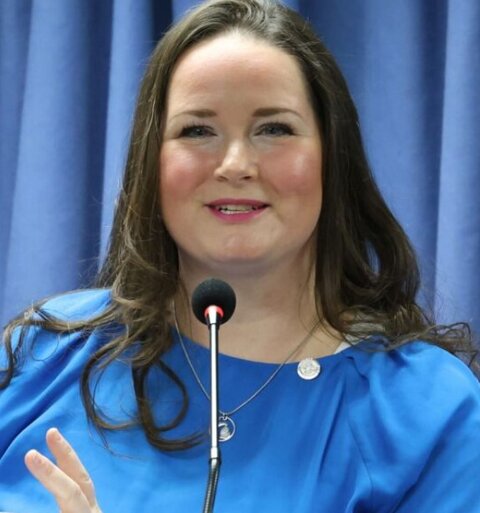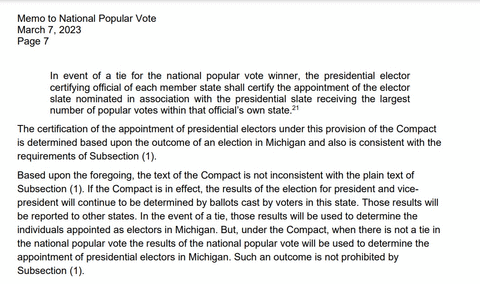Testimony reveals that National Popular Vote has many critics in Michigan
On an Elections Committee stacked 6-2 for Dems, written testimony comes out even
A funny thing happened at the March 7 meeting of the Michigan House Committee on Elections.
Testimony was about evenly split over a bill to have Michigan join the National Popular Vote Interstate Compact, an agreement that would pledge Michigan’s votes to the winner of a “national popular vote” as determined by a group of secretaries of state.
The eight-member committee is stacked 6-2 in favor of Democrats, and live testimony was presented so as to create an impression of nearly unanimous support for House Bill 4156. Committee Chair Penelope Tsernoglou allowed only one dissenting voice provided time to speak, according to meeting minutes. Rep. Carrie Rheingans, D-Ann Arbor, who introduced the bill with 34 Democratic co-sponsors, was the first witness to testify.
But written testimony submitted to the committee was less lopsided. For nearly every supporter, there was a detractor.
And while three House Bills — 4033, 4127 and 4128 — received a “favorable roll call” at the March 7 meeting, advancing beyond the committee in a 6-2 vote, 4156 did not receive a vote.
The Mackinac Center’s David Guenthner, vice president for government affairs, submitted written testimony opposing the bill.
Guenthner noted that in the event of a tie, a nationwide recount would be “practically impossible.”
This is important, because only in the event of a tie would the state vote tally for Michigan be the deciding factor. As a tie is all but statistically impossible, the result of National Popular Vote would be disenfranchisement of the Michigan voter.
Related reading: National Popular Vote would disenfranchise Michigan voters
Bill Richardson, a citizen who chose to speak up, made that point in his written testimony, which was emailed to the committee.
“If 100% of Michigan voters voted for President A, and President B wins the National Popular Vote, every one of Michigan’s voters would have voted for no reason whatsoever,” Richardson wrote. “What does that do for Michigan? How does that help Michigan? It doesn’t, at all!”
The pro side was mostly made up of political elites, including Randy Richardville, a former Republican lawmaker, and Steven Liedel, formerly counsel for Gov. Jennifer Granholm.
Liedel’s argument is that nothing in current law stops Michigan from joining such a compact. But Liedel admits that the National Popular Vote scheme would render the state-level vote tally meaningless.
Hillsdale Professor Gary Wolfram took the pro side as well, arguing that the current system elects “president of the Battleground States,” not president of the United States. Wolfram was one of three who testified under the banner of “Conservatives For National Popular Vote,” joining Richardville and Kim Meltzer, a former lawmaker who is now clerk of Clinton Township.
Taking the opposite tack was Jasper Hendricks III, who testified against the bill on behalf of “Democrats for the Electoral College.”
“In order to support this effort,” Hendricks wrote, “you must ask yourself, what national popular vote?”
Hendricks notes the there is no individual or institution empowered to certify a national popular vote. This means it would fall to secretaries of state in national popular vote states to choose the president among themselves.
What’s presented as a democratic system would actually be a return to smoke-filled rooms. Under National Popular Vote, the elite would select the president; the people would not elect the president.
Sean Parnell, senior director of Save Our States Action, which defends the Electoral College system, wrote a 78-page takedown of the National Popular Vote scheme.
“I’d like to point out the obvious problem with this bill,” Parnell wrote. “If it passes and ever goes into effect, Michigan voters would no longer be entrusted with the power to choose which presidential candidate receives the state’s support and electoral votes. That power would be given away to voters in other states, who will make that choice for Michigan, even overruling the choice of voters in your state.”
House Bill 4156 was introduced by Rheingans on March 2 and referred to the House Committee on Elections.
Michigan Capitol Confidential is the news source produced by the Mackinac Center for Public Policy. Michigan Capitol Confidential reports with a free-market news perspective.



